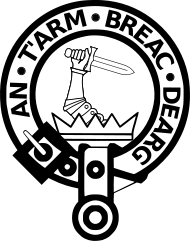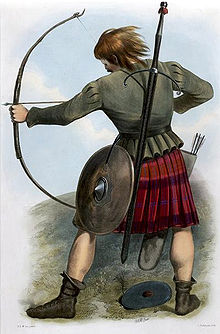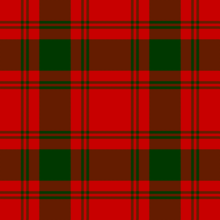- Clan MacQuarrie
-
Clan MacQuarrie Crest badge 
Crest: Out of an antique crown, An arm in armour embowed, grasping a dagger, all proper.[1] Motto: Turris fortis mihi Deus, (translation from Latin: God is to me a tower of strength).[2] Slogan: An t'arm breac dearg, (translation from Scottish Gaelic: The red tartaned army).[1] Profile Region Inner Hebrides
Scottish HighlandsDistrict Ulva, Staffa and the Isle of Mull Plant badge pine.[2] Chief Clan MacQuarrie has no chief, and is an armigerous clan Last Chief: Lachlan Macquarrie of Ulva Died: 1818 Clan MacQuarrie is a Highland Scottish clan, associated with the islands of Ulva, Staffa and the Isle of Mull, which are all located in the Scottish Inner Hebrides.[2] The last chief of Clan MacQuarrie died in 1818 and since the clan does not have a current Chief recognized by Lord Lyon it can be viewed as an Armigerous clan. The family papers of the clan were lost to a fire in 1688, and consequently much of early clan tradition that exists is considered suspect.[2] According to the nineteenth century historian William F. Skene, Clan MacQuarrie is one of the seven clans of Siol Alpin, as the manuscript of 1450 gives the clan's descent from Guaire or Godrey, brother of Fingon (supposed ancestor of Clan MacKinnon) and Anrias (supposed ancestor of Clan Gregor).[3] The clans of Siol Alpin claim a descent from Alpín, the father of Cináed mac Ailpín of whom popular tradition describes as the first King of Scots.
Contents
History
 A Victorian era, romanticised depiction of a member of the clan by R. R. McIan, from The Clans of the Scottish Highlands, published in 1845.
A Victorian era, romanticised depiction of a member of the clan by R. R. McIan, from The Clans of the Scottish Highlands, published in 1845.
 The MacQuarrie tartan. Today this is the most common MacQuarrie tartan, and it is very similar to the "MacDonald of the Isles" tartan.
The MacQuarrie tartan. Today this is the most common MacQuarrie tartan, and it is very similar to the "MacDonald of the Isles" tartan.
Clan MacQuarrie is first found in possession of the island of Ulva in the Scottish Inner Hebrides, and as a result was dependent on the Lords of the Isles.[3] The first record of Clan MacQuarrie is of the chief John Macquarrie of Ulva, who died in 1473.[4] John's son, Dunslaff, was the chief of the clan during the forfeiture of the Lord of the Isles, after which the MacQuarries gained some independence, though a minor clan surrounded by more powerful ones.[3] Following the fall of the Lordship of the Isles the clan followed Maclean of Dowart, and with the Macleans, the MacQuarries supported Domhnall Dubh's quest for the Lordship of the Isles at the beginning of the sixteenth century.[4] In 1504 MacGorry of Ullowaa, along with other chiefs, was summoned to answer for aiding in Donald Dubh's failed rebellion.[4] The following chief, Dunslaff's son John, was one of the chiefs denounced in 1504, for treasonous correspondence with the King of England.[4]
The clan suffered grievously at the Battle of Inverkeithing on July 20, 1651, as they supported the Scots forces in aid of Charles II of England against an English Parliamentarian army led by John Lambert.[4] In the battle the Scots were decisively defeated by the well disciplined New Model Army of the English, and amongst the slain was Allan Macquarrie of Ulva, chief of Clan MacQuarrie, and most of his followers.[4]
The last chief of Clan MacQuarrie, was Lachlan Macquarrie of Ulva. MacQuarrie was head of the clan when Samuel Johnson and James Boswell visited Ulva in 1773.[4] Debts to creditors forced the last chief to sell off his lands and in 1778, at the age of 63, he joined the British Army.[4] The chief then served in the American Revolutionary War, and died at the age of 103 in 1818, with the title Lord Lynedoch.[5]
Notable members
- Lachlan Macquarie (1762-1824) Governor of New South Wales (1810-1824).
See also
Notes
- ^ a b MacQuarrie Heraldry Retrieved on September 14, 2007
- ^ a b c d Smibert, pp.113-117.
- ^ a b c Skene, pp. 263-264.
- ^ a b c d e f g h Maclauchlan & Wilson & Keltie, pp. 262-265
- ^ Smibert gives Lachlan Macquarrie's age of joining the Army at 62, and his date of death 1817 aged 102. Maclauchlan & Wilson & Keltie give his age of joining the Army at 63, and his date of death at 1818, aged of 103.
References
- Maclauchlan, Thomas & Wilson, John & Keltie, John Scott. A History of the Scottish Highlands, Highland Clans and Highland Regiments. Edinburgh and London: A. Fullarton & Co., 1875.
- Skene, William Forbes. The Highlanders of Scotland, Their Origin, History, And Antiquities. London: John Murray, 1837.
- Smibert, Thomas. The Clans of the Highlands of Scotland. Edinburgh: James Hogg. 1850.
External links
Scottish clans Clans with chiefs Agnew · Anstruther · Arbuthnott · Arthur · Bannerman · Barclay · Borthwick · Boyd · Boyle · Brodie · Broun · Bruce · Buchan · Burnett · Cameron · Campbell · Carmichael · Carnegie · Cathcart · Charteris · Chattan · Chisholm · Cochrane · Colquhoun · Colville · Cranstoun · Crichton · Cumming · Darroch · Davidson · Dewar · Drummond · Dunbar · Dundas · Durie · Elliot · Elphinstone · Erskine · Farquharson · Fergusson · Forbes · Forsyth · Fraser · Fraser of Lovat · Gayre · Gordon · Graham · Grant · Gregor · Grierson · Guthrie · Haig · Haldane · Hamilton · Hannay · Hay · Henderson · Home · Hope · Hunter · Irvine · Jardine · Johnstone · Keith · Kennedy · Kerr · Kincaid · Lamont · Leask · Lennox · Leslie · Lindsay · Lockhart · Lumsden · Lyon · MacAlister · MacBain · MacDonald · Macdonald of Clanranald · MacDonald of Keppoch · Macdonald of Sleat · MacDonell of Glengarry · MacDougall · Macdowall · MacIntyre · Mackay · Mackenzie · Mackinnon · Mackintosh · Maclachlan · Maclaine of Lochbuie · MacLaren · MacLea (Livingstone) · Maclean · MacLennan · MacLeod · MacLeod of Lewis · MacMillan · Macnab · Macnaghten · MacNeacail · MacNeil · Macpherson · MacTavish · MacThomas · Maitland · Makgill · Malcolm (MacCallum) · Mar · Marjoribanks · Matheson · Menzies · Moffat · Moncreiffe · Montgomery · Morrison · Munro · Murray · Napier · Nesbitt · Nicolson · Ogilvy · Oliphant · Primrose · Ramsay · Rattray · Riddell · Robertson · Rollo · Rose · Ross · Ruthven · Sandilands · Scott · Scrymgeour · Sempill · Shaw · Sinclair · Skene · Spens · Stirling · Strange · Stuart of Bute · Sutherland · Swinton · Trotter · Urquhart · Wallace · Wedderburn · Wemyss · Wood ·
Armigerous clans Abercromby · Abernethy · Adair · Adam · Aikenhead · Ainslie · Aiton · Allardice · Anderson · Armstrong · Arnott · Auchinleck · Baillie · Baird · Balfour · Bannatyne · Baxter · Bell · Belshes · Bethune · Beveridge · Binning · Bissett · Blackadder · Blackstock · Blair · Blane · Blyth · Boswell · Brisbane · Buchanan · Butter · Byres · Cairns · Calder · Caldwell · Callender · Campbell of Breadalbane · Campbell of Cawdor · Carruthers · Cheyne · Chalmers · Clelland · Clephane · Cockburn · Congilton · Craig · Crawford · Crosbie · Cunningham · Dalmahoy · Dalrymple · Dalzell · Dennistoun · Don · Douglas · Duncan · Dunlop · Edmonstone · Fairlie · Falconer · Fenton · Fleming · Fletcher · Forrester · Fotheringham · Fullarton · Galbraith · Galloway · Gardyne · Gartshore · Ged · Gibsone · Gladstains · Glas · Glen · Glendinning · Gray · Gunn · Haliburton · Halkerston · Halket · Hepburn · Heron · Herries · Hogg · Hopkirk · Horsburgh · Houston · Hutton · Inglis · Innes · Kelly · Kinloch · Kinnaird · Kinnear · Kinninmont · Kirkcaldy · Kirkpatrick · Laing · Lammie · Langlands · Learmonth · Little · Logan · Logie · Lundin · Lyle · MacAulay · Macbrayne · MacDuff · MacEwen · MacFarlane · Macfie · Macgillivray · MacInnes · MacIver · Mackie · MacLellan · Macquarrie · Macqueen · Macrae · Masterton · Maule · Maxton · Maxwell · McCorquodale · McCulloch · McKerrell · Meldrum · Melville · Mercer · Middleton · Moncur · Monteith · Monypenny · Mouat · Moubray · Mow · Muir · Murray of Atholl · Nairn · Nevoy · Newlands · Newton · Norvel · Ochterlony · Orrock · Paisley · Paterson · Pennycook · Pentland · Peter · Pitblado · Pitcairn · Pollock · Polwarth · Porterfield · Preston · Pringle · Purves · Rait · Ralston · Renton · Roberton · Rossie · Russell · Rutherford · Schaw · Seton · Skirving · Somerville · Spalding · Spottiswood · Stewart · Stewart of Appin · Strachan · Straiton · Strange · Sydserf · Symmers · Tailyour · Tait · Tennant · Troup · Turnbull · Tweedie · Udny · Vans · Walkinshaw · Wardlaw · Watson · Wauchope · Weir · Whitefoord · Whitelaw · Wishart · Young
Culture and society Scotland · Clan chief · Septs · Clan badge · Clan crest · Clan battles · Tartan · Bagpipes · Clearances · Kilt · Manrent · The Highlands · Battle of Culloden · Highland games · Border Reivers · Scottish heraldry · Scottish surnames
Categories:- Armigerous clans
- Scottish clans
Wikimedia Foundation. 2010.

